'Rambo: First Blood Part II': Five things you might not know including John Travolta's missing role
John Rambo drew First Blood in the 1982 hit that starred Sylvester Stallone in his inaugural appearance as a Vietnam War veteran-turned-one man army.
But it was the sequel, Rambo: First Blood Part II, that really set the tone for how the franchise is remembered. Blasting into cinemas in 1985, Rambo transformed the title character from a troubled loner into the ultimate American warrior, one who was immediately embraced by both moviegoers, the military and the Commander in Chief.
“Now we see a Rambo that’s more confident,” Stallone said of the sequel’s appeal in a 2002 DVD featurette. “A Rambo hellbent on rewriting his own history. Now he gets a chance, which is something a lot of people don’t in life: It’s redemption.”
Where First Blood took place on American soil, First Blood Part II moves the action to the jungles of Vietnam, where Rambo is tasked with locating long-missing prisoners of war. And once he’s back in the country, Rambo turns his covert mission into a full-fledged war, battling both Vietnamese and Russian soldiers, as well as American bureaucrats — as represented by Charles Napier’s CIA agent, Roger Murdock — who would prefer to let the past die.
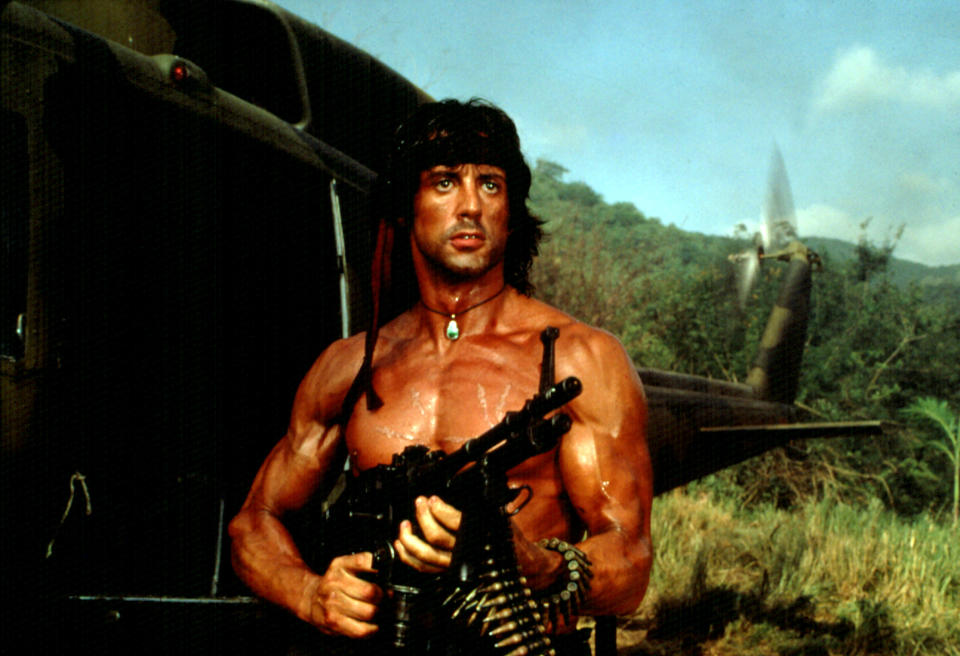
Released a full decade after the last American helicopter departed Saigon (not to mention during the height of 1980s Cold War tensions), the movie imagines a wish-fulfilment scenario that Rambo handily summarises in the first scene: “Do we get to win this time?”
That question propelled First Blood Part II to a $300 million global gross, as well as an unlikely animated series, multiple rip-offs and three sequels: 1988’s Rambo III, 2008’s Rambo and 2019’s Rambo: Last Blood, none of which matched the box-office firepower of the second instalment.
Read more: Mixed reviews for ‘deranged’ Rambo: Last Blood
Thirty-five years later, here are five things you probably didn’t know about one of the defining action movies of the 1980s.
James Cameron wrote the first draft of the screenplay
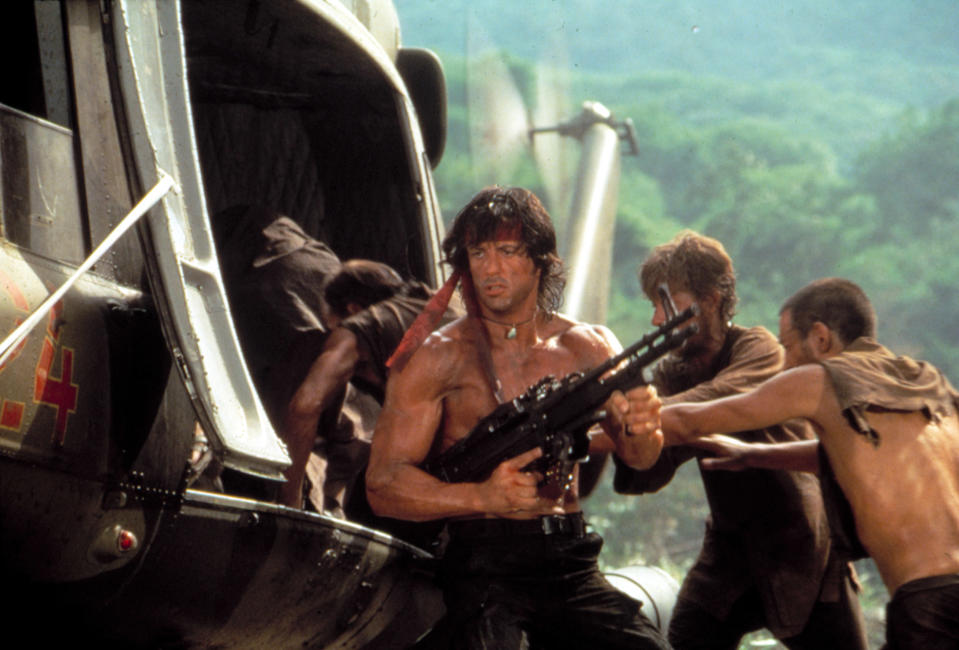
There would never have been a First Blood Part II if First Blood had stuck with its original ending. Director Ted Kotcheff intended to hew closer to the downbeat finale of David Morrell’s 1972 novel, where Rambo dies after fighting the police force of a small Washington town.
As scripted and shot, the wounded veteran is visited by his former commanding officer, Sam Trautman (Richard Crenna) and essentially commits suicide by grabbing the colonel’s gun. “It was incredibly moving,” Kotcheff told Entertainment Weekly in 2017. “[But] Sylvester got up and said, ‘Ted, can I talk to you for a second?’ He said, ‘You know, Ted, we put this character through so much… All this, and now we’re gonna kill him?’”
So the director and star quickly filmed an alternate version where Rambo lives to fight another day — a fortuitous decision as test audiences unanimously rejected the darker ending. “Unhappy endings are intellectual endings,” Kotcheff remarked in his EW interview. “But happy endings are popular endings. To which I might add, for Andy Vajna and Mario Kassar, who produced three Rambo sequels: Profitable endings, too!”
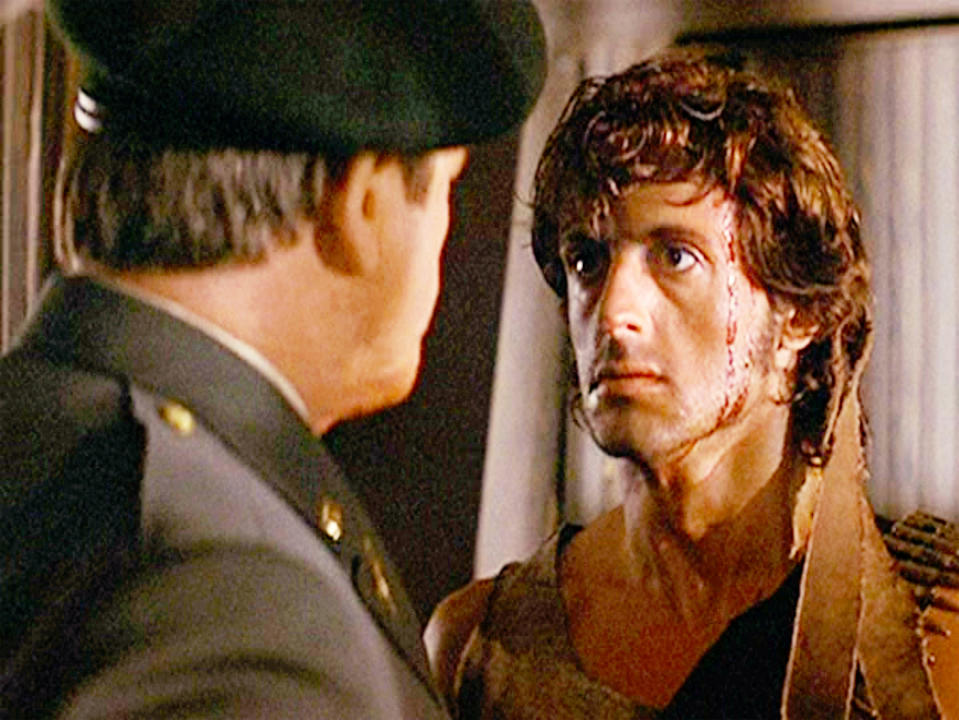
Once the box-office grosses for First Blood rolled in, Vajna and Kassar wasted little time commissioning a second instalment from an up-and-coming screenwriter and director: James Cameron. At the time, Cameron had recently completed his directorial debut, Piranha II: The Spawning, and was trying to raise funds to make his own ‘80s action classic, The Terminator. In December 1983 — a little over a year after First Blood hit cinemas — he delivered his script to Vajna and Kassar, entitled First Blood II: The Mission.
In a notable departure from the theatrical film, Cameron’s script opens in a mental institution where Rambo has been confined since the events of the first movie. Having shown up to recruit his top soldier to participate in the POW mission, Trautman finds Rambo in extreme isolation and treated with a mixture of fear and loathing by the security staff… not unlike Sarah Connor’s introduction in Terminator 2: Judgement Day.
Once Cameron submitted his draft, Stallone took over scripting duties and wrote the version that went before cameras in June 1984. According to the Hollywood legend, though, Cameron’s script circulated beyond the Rambo production offices. The Chuck Norris star vehicle, Missing in Action — which is also about a Vietnam veteran on a bloody mission to find POWs — was rumoured to have been “inspired” by The Mission and actually beat First Blood Part II to theatres. Missing in Action opened in November 1984, one month after The Terminator blew moviegoers away and ensured that Cameron never had to write work-for-hire sequel scripts again.
John Travolta was going to be Rambo’s wisecracking sidekick

Stallone’s re-write of Cameron’s script stuck to the same Rambo-on-a-mission outline, but with some key alterations. The biggest change between versions is the elimination of the movie’s co-lead, Lieutenant Brewer, who Cameron created to serve as Rambo’s sidekick in the field and also be the modern counterpart to his old-school fighter. His original script describes Brewer as a “lanky, but muscular” guy who has “boyish good looks and hair cut so short it barely qualifies as stubble,” as well as “one of those hard-to-dislike Southern accents” — an extreme contrast with Stallone’s long-haired, low-talking hero. As First Blood Part II director, George P. Cosmatos, revealed in a 2002 DVD featurette, the producers only had one person in mind for the part: John Travolta.
“It was supposed to be Sly and John Travolta together,” Cosmatos said of the unlikely pair, who had recently teamed up for 1983’s Staying Alive, the legendarily awful Saturday Night Fever sequel that Stallone directed. In the script, Rambo and Brewer are portrayed as a vintage odd couple, complete with comic asides like a scene where they try to out-alpha each other in a push-up contest at base camp. Once on the ground in Vietnam, they’re similarly at odds with Brewer chafing at his partner’s wizened warrior act, while Rambo rolls his eyes at Brewer’s reliance on high-tech firepower and corny jokes. The more time they spend behind enemy lines, though, the more they develop into a cohesive unit — although Rambo’s superiority as a soldier is never really in doubt.
Maybe that’s the reason why the producers ultimately decided to ditch the Brewer character altogether. “We were thinking about buddies, but we felt ultimately that this was [about Rambo],” Vajna remarked in a featurette. The loss of Rambo’s “buddy” also meant the loss of all the buddy comedy that Cameron wrote into the script, including a moment during the climactic helicopter chase where Brewer compares Rambo’s piloting to Star Wars. “Star Wars?” asks a puzzled POW that the duo rescued. “You’re gonna love it,” Brewer replies.
Mexico played Vietnam

Kotcheff bowed out of continuing with the franchise he launched when he learned about Rambo’s extreme makeover in First Blood Part II. “In my film, he’s against killing, he won’t kill anybody,” the director explained to Entertainment Weekly.
“In the sequel, he’s turned into a killing machine. He kills about 75 people! I said, ‘That’s not the character I created. If you’re gonna do that, good luck, have a good time.’” The Italian-born Cosmatos eventually landed the gig, and had grand plans to shoot the film on location in northern Thailand. Unfortunately, a lack of resources and rising costs scuttled that plan, and the production settled south of the American border instead in the countryside surrounding Acapulco.
Read more: Rambo gets a Bollywood remake
“We built rock quarries, rice paddies and statues to give you the feeling [of Vietnam],” Cosmatos explained on a commentary track featured on the Rambo DVD, adding that an early shot of a Buddha statue was filmed on a parking lot. “The statue was a huge Styrofoam statue painted gold.” (The director died in 2005.) Other behind-the-scenes tricks included dumping pounds of instant coffee into the prison camp mud pit where Rambo is chained, and rigging up wires so that his arrows would always hit the right target.
Years later, Rambo found his way back to Mexico in Rambo: Last Blood, the poorly-reviewed fifth film that finds him battling a drug cartel using the tricks of the trade he picked up in Vietnam. In a case of history repeating itself, the Mexico sequences were filmed elsewhere — specifically a combination of Bulgaria and Louisiana.
Rambo’s big emotional moment hit the cutting room floor
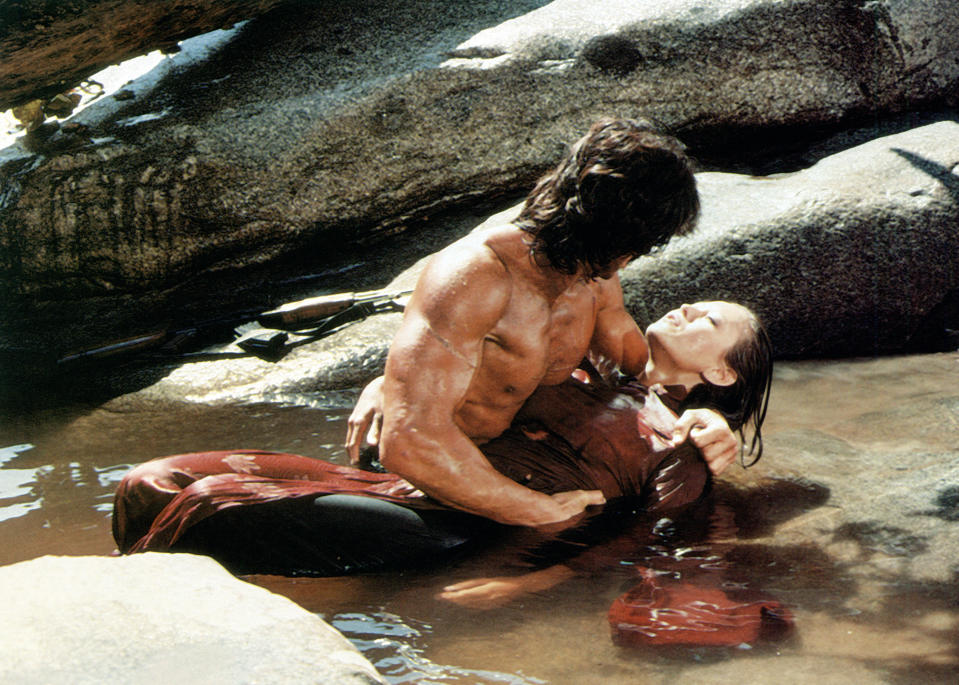
Rambo isn’t generally synonymous with romance, but First Blood Part II gives him the closest thing he’s ever had to a love story. After parachuting into Vietnam, he meets up with on-the-ground covert agent Co Phuong Bao, played by Singaporean-born actress, Julia Nickson.
The two survive various perils — from river pirates to roving groups of Vietnamese soldiers — until Rambo is captured and ends up in a particularly brutal prison camp overseen by Russian troops. Tortured within an inch of his life, he nonetheless summons the strength to turn the table on his captors. Co joins his escape attempt and after a pitched battle with Vietnamese and Russian troops, the two eventually find a quiet spot for a rare quiet moment.
“You look like hell, Rambo,” Co tells him, before tenderly asking where he plans to go once he finds a way out of Vietnam — America by way of Thailand. Taking charge, she invites herself along and seals the invitation with a kiss.
It goes without saying that Rambo’s normally stoic face registers surprise, and maybe even a little fear, at this compassionate gesture. “Stallone wrote this small love story, which I think makes him much more vulnerable,” Cosmatos explained in a DVD featurette. Nickson, meanwhile, said that she pushed to include the kiss, despite it seeming potentially out of place in a combat movie. “I felt my character should have a possibility of what could happen between them, of sense of a dream that was in the making.”
Unfortunately, the kiss also seals Co’s death warrant: As soon as they leave their hiding place, a hail of gunfire cuts her down. “Do not forget me,” she says as she takes her final breaths, and Rambo proceeds to take his vengeance on her killers. (Co lives on, after a fashion, in Rambo III, which features Rambo wearing the Buddha symbol she gifts him.)
According to editors Mark Helfrich and Mark Golblatt, Rambo’s original reaction to his almost-lover’s death had to be cut from the movie since it sent the tone spiralling from tragic to comic. “Rambo is holding her in his arms… and then he lets out this scream: ‘Noooooo!’ And the camera popped out wider, wider, wider, and the ‘No!’ echoed across the land. The audience went wild; they started laughing hysterically. [We] looked at each other and said, ‘That comes out.’”
Sounds like Rambo could take Darth Vader in a “No” screaming contest.
Ronald Reagan was Rambo’s No. 1 fan
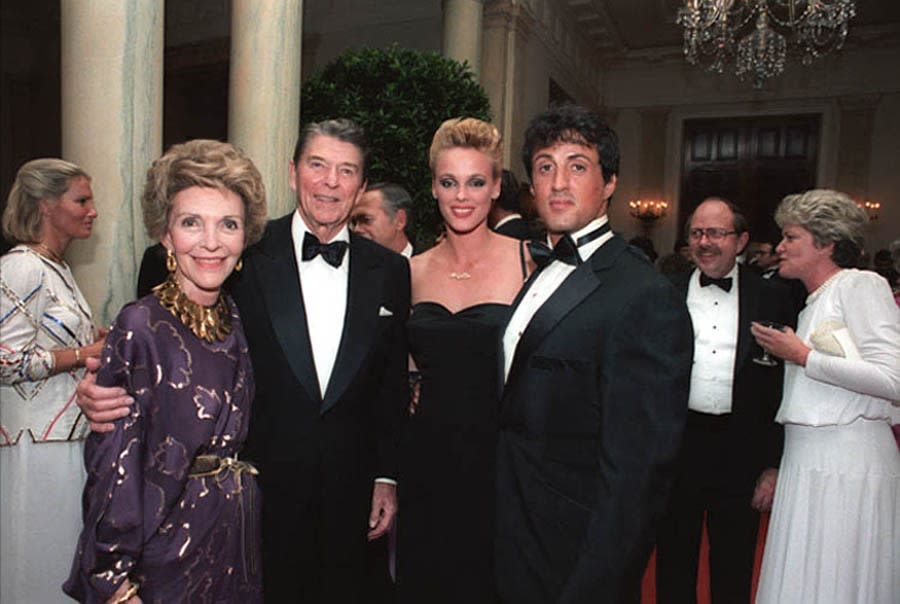
As a veteran of war movies — though not of the frontlines, as poor eyesight kept the reservist from serving overseas during World War II — President Ronald Reagan was particularly taken with First Blood Part II. Throughout the summer of 1985, the 40th POTUS made numerous references to the film as it continued to rake in multiplex money. In June, for example, Reagan announced the release of 39 hostages from the TWA Flight 847 hijacking, and reportedly joked: “After seeing Rambo last night, I know what to do the next time this happens.”
Three months later, Reagan again referenced Stallone’s alter ego while discussing his tax reform plan. “When I think of all the good people who’ve pleaded with the federal government for years to clean up our tax structure, I am reminded of a recent, very popular movie — and in the spirit of Rambo, let me tell you we’re going to win this time.” For his part, Stallone seemed delighted by the Oval Office recognition, even gifting his biggest fan with a signed First Blood Part II poster that’s currently housed at the Ronald Reagan Presidential Foundation & Institute. “To President Reagan: Best of life, and all the best for the future,” the inscription reads.
In later years, though, the actor expressed more ambivalence about being embraced so forcefully by the Reagan administration and, by extension, the mainstream Republican Party and its pursuit of a more interventionist foreign policy. “I heard President Reagan quoting lines from Rambo,” Stallone remarked in the 2002 featurette, Guts and Glory.
“I was proud, but I also was a little apprehensive about the reaction. Right now, it had taken a political form. People thought, ‘OK Rambo is a Republican.’” The star goes on to argue that the embrace of Rambo by Republican politicians, as well as the military, obscures what the character actually stands for. “Rambo denies any association with the military — he’s not part of it. [It became] Army = Rambo, which is unfortunate because the men in the military are the real deal. Rambo is fiction.”
Rambo: First Blood Part II is streaming on NOW TV.

 Yahoo Movies
Yahoo Movies 

